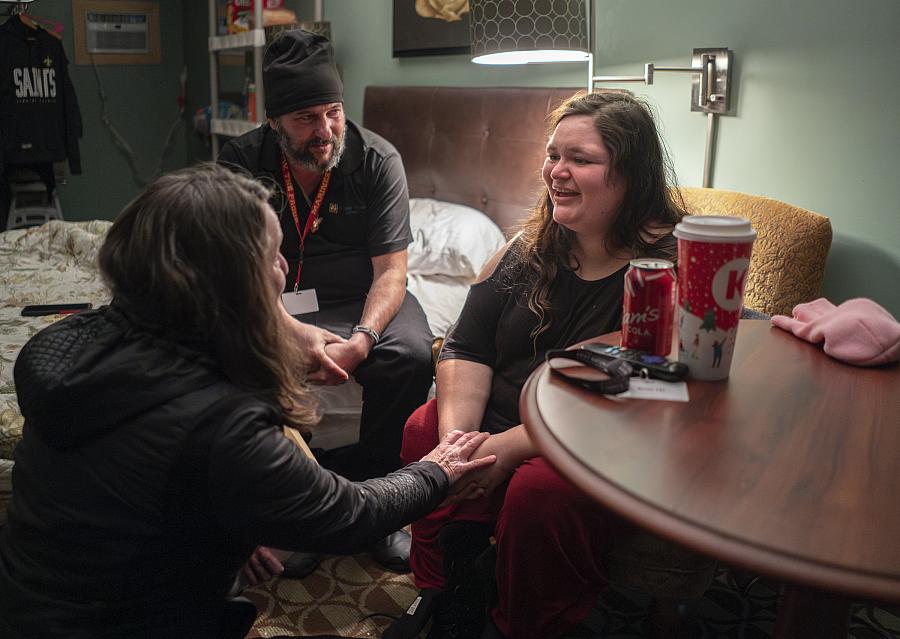Here’s what I learned reporting on Michigan’s growing 'cash prescriptions' program

Christy Curtis, a nurse with the Chippewa County Health Department’s maternal infant health program, speaks with Kayla Wychopen, 26, and her boyfriend James Allard, 45, about Wychopen’s pregnancy at his motel room in Sault Ste. Marie on Thursday, Feb. 6, 2025.
(Photo by Ryan Garza/Detroit Free Press)
Last year, moms in Flint, Michigan, began receiving no-strings-attached "cash prescriptions" — as much as $7,500.
Dubbed Rx Kids, the program kicked off in a city where roughly half of kids under 5 years old live under poverty, much higher than the statewide figure of 19%. The initiative had a bold mission: slash infant poverty.
When I learned last year that Dr. Mona Hanna — the pediatrician who helped expose the Flint water crisis a decade ago — was behind this new effort and that it was expanding to other parts of Michigan, I wanted to know: Could cash in hand actually make a dent on poverty among the state's youngest?
To answer that question, I talked to poverty experts, lawmakers, county officials, nurses, and most importantly, expectant moms.
First, we looked at how two programs in two cities — Rx Kids in Flint, Michigan and the Magnolia Mother's Trust in Jackson, Mississippi — are experimenting with no-string-attached cash aid. I reported on the financial challenges of moms 900 miles apart and how extra cash in hand helped them.
I also spoke to Hanna about what she saw as a Flint pediatrician that pushed her to start Rx Kids. The program — providing $1,500 mid-pregnancy and $500 a month for up to a year of the infant's life — was born out of a refusal to let children grow up in poverty, she said.
"So much of what ails my children that I care for, so much of what makes people sick at a population level, the root cause is poverty," she told me.
Bipartisan lawmakers in Michigan were invested in the program, too. I spoke to state legislators in regions of the state where Rx Kids is expanding, who saw early promise and said they were watching for outcomes that would spell success, from increased birth rates and school enrollment to improvements in child development and health.
And finally, I spoke to expectant moms, ranging from the west side of the state to its northernmost region, where Rx Kids was expanding, to learn how extra cash in hand could alleviate their financial challenges.
I wanted to report on child poverty in regions across Michigan, from urban to rural areas. I wanted to hear straight from expectant moms on whether Rx Kids could indeed make a difference and inform lawmakers, community members and readers on what they had to say, especially as research suggests that having a baby increases the likelihood of poverty, particularly among Black and Latina mothers.
Months of reporting, from Jackson, Mississippi to Sault Ste. Marie, Michigan, illustrated a portrait of the financial challenges pregnant women face, from transportation and housing to the basic cost of living, and what consistent payments would mean for them and their families. They could pay for everyday basics, such as diapers and wipes. They could save for the future.
Throughout my reporting for this project, I struggled to find expectant moms to interview in Michigan's Upper Peninsula. It took several weeks to identify people comfortable being interviewed and photographed. In the end, a Free Press photographer and I shadowed maternal health nurses as they visited pregnant women in the snowy U.P. Down in Mississippi, we also met mothers at a block party who welcomed us into their homes.
For narrative driven projects, it's important to set aside time to find real people and prepare for rejection, as with any reporting endeavor. For projects about pregnancy and maternal health like mine, I would recommend health professionals, doulas and maternal health programs as a way to connect with expectant mothers. I created call out forms for social media, but those did not yield as many responses as I initially thought.
The project was not as data driven as I had initially thought. That part ended up looking like a few sentences of Census statistics in the story. However, I've learned data skills crucial to my beat and reporting toolkit. Much of the reporting that I did for this story — the data, the interviews, the research — did not wind up in the story, but nonetheless informed the overall package. Though I felt as though I overreported the project, I've learned that there's no such thing as overreporting — the process helped me write with more ease and confidence. I leaned on my senior fellow who provided valuable advice and feedback throughout the project.
Although I sought to answer the broad question asking if cash in hand could alleviate child poverty, I don't think I could have answered that question in just a few months. I had to scale down my ambition and be more realistic with the scope of this project. What I did do is document what the Rx Kids program promises, its impact so far in the city where it first began, and the financial challenges that come with giving birth and raising children, especially during pregnancy and the first year of a child's life.
That may be a narrower focus than my original question, but in the end, it’s an important body of reporting about a rapidly expanding cash aid program as it garnered tens of millions of dollars in public and private dollars, set against the backdrop of a national conversation about the merits of expanded child tax credits and so-called "baby bonuses."

